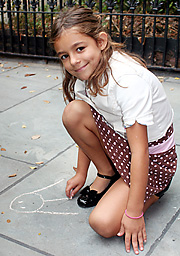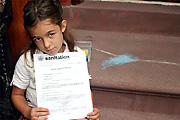 |
|
|
DelMarVa Survival Trainings
Daily Features |
|
|
October 16, 2007
New face of vandalism?
By Gersh Kuntzman
The Brooklyn Paper

Six-year-old Natalie Shea got a
threatening letter from the city
demanding the removal of “graffiti”
she drew with chalk — with chalk! —
on her front step. Here, Shea shows
her defiance to the warning letter
by creating a new work with the
supposedly illegal medium.

Natalie Shea with her warning letter
and the alleged graffiti.
A
6-year-old Park Slope girl is facing
a $300 fine from the city for doing
what city kids have been doing for
decades: drawing a pretty picture
with common sidewalk chalk.
Obviously not all of Natalie Shea’s
10th Street neighbors thought her
blue chalk splotch was her best work
— a neighbor called 311 to report
the “graffiti,” and the Department
of Sanitation quickly sent a
standard letter to Natalie’s mom,
Jen Pepperman.
Can somebody stop these bureaucrats
before they Kafka again?
“PLEASE REMOVE THE GRAFFITI FROM
YOUR PROPERTY,” the Sanitation
Department warning letter read.
“FAILURE TO COMPLY … MAY RESULT IN
ENFORCEMENT ACTION AGAINST YOU.”
Since when is a kid’s chalk drawing
“graffiti”? Since the City Council
passed local law 111 in 2005, which
defined “graffiti” as “any letter,
word, name, number, symbol, slogan,
message, drawing, picture, writing …
that is drawn, painted, chiseled,
scratched, or etched on a commercial
building or residential building.”
In other words, Natalie Shea is not
an artistic little girl, but a
graffiti scofflaw?
No. The law goes on to say that the
scribbles can only be called
“graffiti” if they are “not
consented to by the owner of the
commercial building or residential
building.” But how could the 311
caller possibly be expected to know
if Natalie had her mom’s consent to
use chalk on her own front stoop?
“He could have just asked!”
Pepperman said. “This whole thing is
ridiculous. Admittedly, this drawing
was not her best work — she usually
sticks to cheerful scenes, not
abstracts, frankly — but to send a
warning letter like that is
outrageous.”
Pepperman ticked off any number of
daily insults to common decency on
her block, including (but not
limited to) dog poop, garbage from
ill-kept homes, and noise from car
alarms. But Sanitation didn’t get a
311 call about those indignities. It
got a call about a 6-year-old’s
drawing.
“The report came in as ‘graffiti,’
and, as you know, the city is trying
to crack down on graffiti on private
property,” said agency spokeswoman
Cathy Dawkins.
“It’s a standard warning letter,”
added Dawkins. “The property owner
has 45 days to remove it or ask the
city to remove it. We’ll inspect
after that, and if the graffiti is
still there, the property owner has
another 60 days before we’ll write a
summons.”
For sidewalk chalk that would
dissolve at the first rain? Dawkins
said the law is on her agency’s
side.
“The instrument used — whether it’s
paint or chalk — does not matter,”
she said.
But if Dawkins is right, than the
city has just criminalized hopscotch
or drawing arrows to point neighbors
towards a stoop sale down the block
— as long as a neighbor calls 311 to
complain.
In reality, chalkers have little
reason to start using invisible ink.
The city’s pre-eminent sidewalk
chalk illustrator, Ellis Gallagher,
says he’s outlining street furniture
and other objects for years and
never been arrested.
“Cops stop me all the time when they
see me drawing on the sidewalk, but
once they see it’s just chalk, they
always let me go,” said Gallagher, a
Carroll Gardens resident (see his
work at www.myspace.com/ellis_gee).
Gallagher believes that, despite
local law 111, drawing in chalk is
not illegal. But a call to the NYPD
revealed that there’s a lot of gray
area. “According the New York penal
law, graffiti is the etching,
painting, covering, drawing or
otherwise placing of a mark upon
public or private property with
intent to damage such property,”
said an NYPD spokesman.
When pressed to define “intent” or,
for that matter, “damage,” the
spokesman added: “If it can be
washed away, it’s not graffiti,
clearly, but it still could be
criminal mischief. If I cover your
car with mustard, that’s not
graffiti, but it’s also not legal.”
Pepperman is holding firm that her
daughter is a pretty artist and not
a petty criminal. And for his part,
Natalie’s father, George Shea, hoped
that his daughter wouldn’t learn the
wrong lesson from her “graffiti”
crime wave.
“I do love that kid,” Shea said,
“but I wish she would stop capping
my tags.”
|
|
